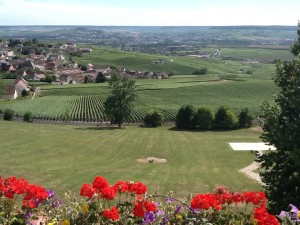
Today we traveled from the western part of France (Bayeux in Normandy) through Paris, to Epernay.
Epernay is in the heart of the Champagne region (notice the vineyards in the pic I took from our hotel room) in Northeast France.
More importantly for our purposes, Epernay is near Reims, where we will journey tomorrow.
We were traveling most of the day and there wasn’t time to see any sights.
So, I thought it a good time to address an issue that has been lurking in the background since I began this travel journal.
How to Approach Medieval Catholicism
I think one of the main reasons Protestants aren’t more interested in the Medieval European Church history is that it is Catholic. While I understand this view I do not advise it. If you were living in Europe in the Middle Ages and wanted to follow Jesus, Catholicism was the only game in town.
One might say, “Okay, but what about the selling of indulgences? How could you be a Christian and believe in that?” Future generations may just as easily ask how modern American Protestants could have believed in the Prosperity Gospel.
Every generation of the Church has had heroes and scoundrels, orthodoxy and heresy, and, there is much to learn from the Medieval Church, both good and bad. In this travel journal I want to focus on the good and how it might be applicable to the kingdom of God in our time.
So, I challenge you to set aside thoughts of indulgences, corrupt Popes and the inquisition and consider that in every generation of the Middle Ages there were those who loved Jesus with all their heart and for whom the expression of that love came in a Catholic wrapper.
Lastly, since we are in the heart of the Champagne region and on the subject of Catholicism, you might like to know that Dom Perignon is not just the name of the finest champagne in the world; he was in fact a benedictine monk that lived in the 17th century. For many years it was believed Dom Perignon was the inventor of champagne, though that has now been called into question.
Dom Perignon served in the abbey near Epernay and is buried here, but because I couldn’t find a way to connect him to the Crusaders or the Carolingian Renaissance we will not be visiting his tomb, though we will certainly raise a toast to him tonight at dinner. GS

